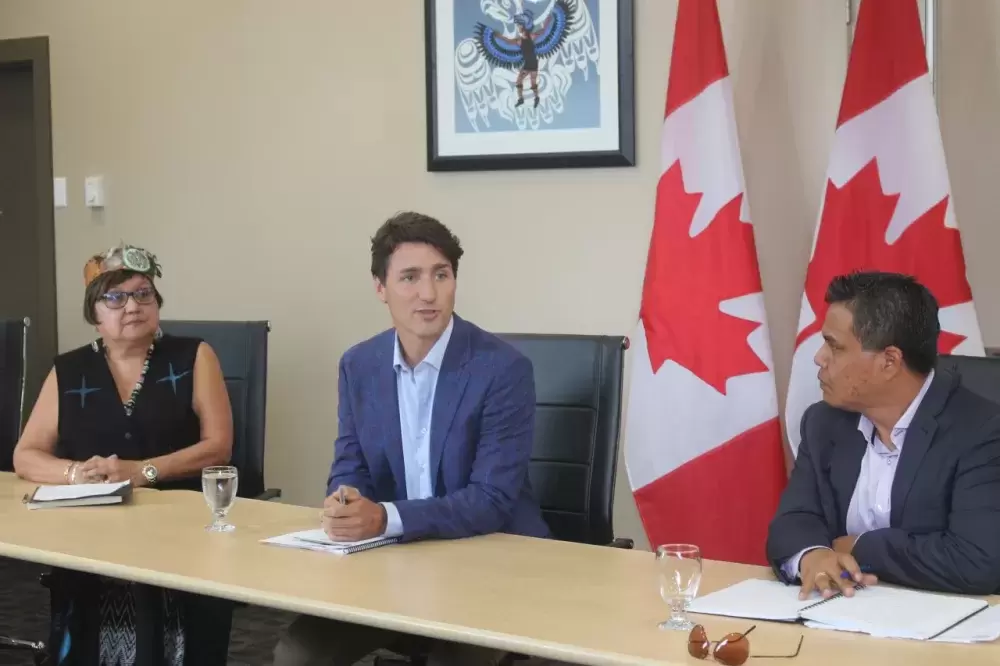Leaders negotiating for the fishing rights of five Nuu-chah-nulth nations are challenging the federal government to back up words with action, after Prime Minister Justin Trudeau vowed to advance Indigenous self-determination in Ottawa last week (Feb. 14).
Meanwhile, the T’aaq-wiihak fishery - which includes the Ahousaht, Hesquiaht, Ehattesaht/Chinekintaht, Tla-o-qui-aht and Mowachaht/Muchalaht First Nations – awaits a letter from Fisheries and Oceans Canada with details on what the federal department is prepared to allow for the upcoming season.
“I was pleased to extend an offer to the five nations to facilitate a transfer of licences and quotas for ground fish, salmon and shellfish,” said Canada’s Fisheries Minister Dominic LeBlanc in the House of Commons on Friday (Feb. 16). “This is a concrete step taken in the spirit of reconciliation.”
But it’s yet to be determined how exactly these licences will affect each of the Nuu-chah-nulth communities involved, said Saul Milne, acting manager of the T’aaq-wiihak fishery.
“It could be a mixture of things across the territories,” he said, noting that the DFO’s management areas might not coincide with each of the five nations’ territories. “And some of the licences are specific for management areas. We’re just not sure what the mixture will look like.”
For years T’aaq-wiihak - which means fishing with permission of the Ha’wiih – has been negotiating with the DFO for how their Aboriginal right will be accommodated on the water. In 2009 the B.C. Supreme Court ruled that the five nations have the legal right to catch and sell fish from their territories, but a plan on how exactly this will be carried out has yet to be seen from Canada’s fishing authorities.
After the DFO’s offer is received, Milne expects that it will take T’aaq-wiihak’s lead negotiators several weeks to assess the offer and determine how it meets their aboriginal right.
“What we expect to get is a table with licences that spell out some of the access and allocation,” he said. “The nations will have had their own ideal package of access and allocation in mind, and whatever DFO offers up will likely not look like what that ideal world looks like. So it will probably spur on more discussion with the nations and DFO.”
LeBlanc’s offer follows a speech from the Prime Minister in the House of Commons last week (in mid-February) that pledged his Liberal government will develop a new “recognition and implementation of Indigenous rights framework” based on consultations with Aboriginal communities.
"We need to get to a place where Indigenous peoples in Canada are in control of their own destiny, making their own decisions about their future," said Trudeau. "Instead of outright recognizing and affirming Indigenous rights, as we promised we would, Indigenous peoples were forced to prove, time and time again, through costly and drawn-out court challenges, that their rights existed, must be recognized and implemented."
For many Nuu-chah-nulth-aht, Trudeau’s words appear to be specifically referencing the history of the Ahousaht et al. court case. For over a decade this litigation has been in courts, and unsuccessful federal appeals followed the 2009 ruling in favour of the nations. A B.C. Supreme Court decision on how exactly the five nations’ rights will be justified on the west coast waters is imminent.
Cliff Atleo, Ahousaht’s lead T’aaq-wiihak negotiator, would like to see more than speeches from the federal government.
“We again call on Canada to prove that it is serious about recognising and respecting our Aboriginal right to fish and sell fish,” he said in a T’aaq-wiihak media statement. “This government continues to talk a lot about a new relationship with indigenous people and respecting our Aboriginal rights, but we are still waiting for this government to actually do something that is meaningful to our Ha’wiih and fishers.”
In the statement Tla-o-qui-aht negotiator Francis Frank noted that the five nations had written to Minister of Justice Jody Wilson-Raybould asking for the government’s lawyers to “drop one of Canada’s offensive and aggressive legal positions that seeks to redefine and diminish our Aboriginal right to fish and sell fish.”
“If Canada, as the Prime Minister stated yesterday, is serious about recognising and implementing Indigenous rights, then Canada can’t at the same time be arguing in court a position designed to reduce our right to fish and sell to something that is meaningless and belittles our fishing culture,” said Frank.
The nations’ written request was delivered to the minister of justice by Gord Johns, member of Parliament for Courtenay-Alberni. An inquiry to the federal government from Johns revealed that Canada has spent over $19 million in legal fees opposing the nations’ right to fish since 2006. This includes Stephen Harper’s Conservatives and Trudeau’s Liberals currently in power, said the MP.
“We don’t know how much has been spent by each government, but we do know that the government has been constantly in court – even this government - trying to diminish the right of the nations,” said Johns. “I think anybody in our communities knows that they don’t want to see their tax dollars fighting Indigenous people in court. That money would be better served getting people on the water fishing from those communities.”
The freedom to pursue this occupation has been the foremost concern identified to the MP in his consultations with Vancouver Island’s Nuu-chah-nulth communities.
“We know - certainly in the Alberni Valley and on the west coast - that a lot of the quota, a lot of the fish that are harvested in our communities commercially are from licence holders that don’t live in our communities,” said Johns. “When we make sure that the rights are in the hands of the local communities, that money will circulate in our communities. It will drive the economy on the west coast - it’ll be a game changer for west coast communities when this gets resolved.”







